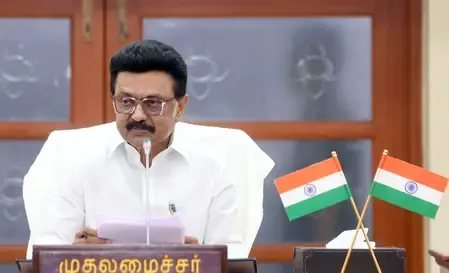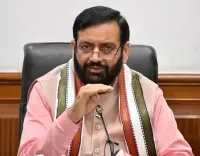Why does CM Stalin celebrate Uddhav Thackeray's commitment to federalism?

Synopsis
Key Takeaways
- CM Stalin praises Uddhav Thackeray for his opposition to Hindi imposition.
- The birthday message highlights the importance of federalism.
- This exchange represents unity among regional parties.
- Both leaders advocate for linguistic rights in India.
- Collaboration is crucial ahead of the 2026 elections.
Chennai, July 27 (NationPress) Tamil Nadu Chief Minister M. K. Stalin on Sunday warmly congratulated Uddhav Thackeray, the former Chief Minister of Maharashtra and current leader of Shiv Sena (UBT), on his birthday. Stalin commended Thackeray for his steadfast opposition to the imposition of Hindi and his relentless dedication to safeguarding Maharashtra's linguistic and cultural heritage.
In a social media message, CM Stalin highlighted Thackeray's significant contributions towards defending India's federal framework and advocating for the rights of regional languages.
He noted that Thackeray's role serves as an inspiration for the Marathi community in their pursuit of preserving their language and identity.
"Happy birthday to Shiv Sena-UBT President, Thiru. Uddhav Thackeray. Your courageous fight against Hindi imposition and your strong advocacy for Maharashtra's identity have rallied the Marathi people in defense of their language. I wish you continued strength as you champion federalism and linguistic integrity," CM Stalin shared on social media platform X, tagging @ShivSenaUBT_ and @OfficeofUT.
This birthday message also emphasized a broader call for unity among regional parties and leaders who contest the centralization of authority and the perceived imposition of Hindi over indigenous languages.
CM Stalin, a consistent supporter of the two-language policy in Tamil Nadu, has previously expressed his opposition to the three-language formula proposed under the National Education Policy (NEP) 2020, which promotes Hindi in states where it is not the primary language.
Thackeray, renowned for his vigorous defense of Maharashtra's Marathi identity, aligns with other federal advocates in Indian politics who resist what they see as a homogenization of linguistic and cultural identities.
This public display of solidarity between CM Stalin and Thackeray indicates an ongoing collaboration among regional parties dedicated to federalism, state rights, and linguistic diversity—issues likely to remain politically relevant leading up to the 2026 state elections and beyond.





